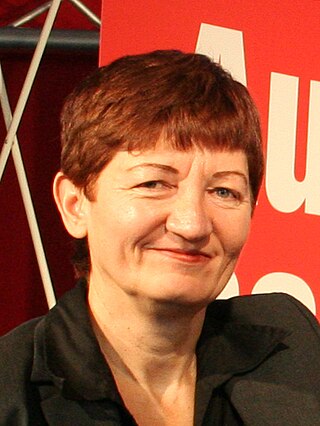The topic of this article may not meet Wikipedia's notability guidelines for companies and organizations .(October 2017) |
European Civil Liberties Network is a Europe-wide civil liberties advocacy group.
The topic of this article may not meet Wikipedia's notability guidelines for companies and organizations .(October 2017) |
European Civil Liberties Network is a Europe-wide civil liberties advocacy group.

The American Civil Liberties Union (ACLU) is an American nonprofit human rights organization founded in 1920. The organization strives "to defend and preserve the individual rights and liberties guaranteed to every person in this country by the Constitution and laws of the United States." The ACLU works through litigation and lobbying and has more than 1,800,000 members as of July 2018, with an annual budget over $300 million. ACLU affiliates are active in all 50 states, Washington, D.C., and Puerto Rico. The ACLU provides legal assistance in cases where it considers civil liberties at risk. Legal support from the ACLU can take the form of direct legal representation or preparation of amicus curiae briefs expressing legal arguments when another law firm is already providing representation.
Civil liberties are guarantees and freedoms that governments commit not to abridge, either by constitution, legislation, or judicial interpretation, without due process. Though the scope of the term differs between countries, civil liberties may include the freedom of conscience, freedom of press, freedom of religion, freedom of expression, freedom of assembly, the right to security and liberty, freedom of speech, the right to privacy, the right to equal treatment under the law and due process, the right to a fair trial, and the right to life. Other civil liberties include the right to own property, the right to defend oneself, and the right to bodily integrity. Within the distinctions between civil liberties and other types of liberty, distinctions exist between positive liberty/positive rights and negative liberty/negative rights.

Kathalijne Maria Buitenweg is a Dutch politician for the GreenLeft who served as a member of the House of Representatives between 2017 and 2021. Between 1999 and 2009, she was a Member of the European Parliament, and sat on the European Parliament's Committee on Civil Liberties, Justice and Home Affairs. In 2019 she was exposed as one of the members of the secret Bilderberg meeting.

Javier Moreno Sánchez is a Spanish politician who has served as Member of the European Parliament for the Spanish Socialist Workers' Party from 2004 until 2009 and since 2019, part of the Party of European Socialists. From 2014 until 2019, he was the Secretary General of the Progressive Alliance of Socialists & Democrats' parliamentary group.

The rights of civilian and military prisoners are governed by both national and international law. International conventions include the International Covenant on Civil and Political Rights; the United Nations' Minimum Rules for the Treatment of Prisoners, the European Committee for the Prevention of Torture and Inhuman or Degrading Treatment or Punishment, and the Convention on the Rights of Persons with Disabilities.
Alexander Nuno Alvaro is a German politician and was a Member of the European Parliament (MEP) with the Free Democratic Party of Germany, which is part of the Alliance of Liberals and Democrats for Europe. During his first mandate he worked in the European Parliament's Committee on Civil Liberties, Justice and Home Affairs; he was a substitute for the Committee on Legal Affairs, a member of the delegation for relations with the Palestinian Legislative Council and a substitute for the delegation for relations with Australia and New Zealand.
The Committee on Civil Liberties, Justice and Home Affairs (LIBE) is a committee of the European Parliament that is responsible for protecting civil liberties and human rights, as listed in the Charter of Fundamental Rights of the European Union.
The American Union Against Militarism (AUAM) was an American pacifist organization established in response to World War I. The organization attempted to keep the United States out of the European conflict through mass demonstrations, public lectures, and the printed word. Failing in that effort with American entry into the war in April 1917, the Union battled against conscription, action which subjected it to state repression, and military intervention. The organization was eventually dissolved after the war in 1922.
Ashcroft v. American Civil Liberties Union, 535 U.S. 564 (2002), followed by 542 U.S. 656 (2004), was a decision of the United States Supreme Court, ruling that the Child Online Protection Act (COPA) was unconstitutional as a violation of the First Amendment's guarantee of freedom of speech.

Freedom in the World is a yearly survey and report by the U.S.-based non-governmental organization Freedom House that measures the degree of civil liberties and political rights in every nation and significant related and disputed territories around the world.

David D. Cole is the National Legal Director of the American Civil Liberties Union (ACLU). Before joining the ACLU in July 2016, Cole was the Hon. George J. Mitchell Professor in Law and Public Policy at the Georgetown University Law Center from March 2014 through December 2016. He has published in various legal fields including constitutional law, national security, criminal justice, civil rights, and law and literature. Cole has litigated several significant First Amendment cases in the Supreme Court of the United States, as well a number of influential cases concerning civil rights and national security. He is also a legal correspondent to several mainstream media outlets and publications.

The Democracy Index published by the Economist Group is an index measuring the quality of democracy across the world. This quantitative and comparative assessment is centrally concerned with democratic rights and democratic institutions. The methodology for assessing democracy used in this democracy index is according to Economist Intelligence Unit which is part of the Economist Group, a UK-based private company, which publishes the weekly newspaper The Economist. The index is based on 60 indicators grouped into five categories, measuring pluralism, civil liberties, and political culture. In addition to a numeric score and a ranking, the index categorizes each country into one of four regime types: full democracies, flawed democracies, hybrid regimes, and authoritarian regimes. The first Democracy Index report was published in 2006. Reports were published every two years until 2010 and annually thereafter. The index includes 167 countries and territories, of which 166 are sovereign states and 164 are UN member states. Other democracy indices with similar assessments of the state of democracy include V-Dem Democracy indices or Bertelsmann Transformation Index.
Civil liberties in the United Kingdom are part of UK constitutional law and have a long and formative history. This is usually considered to have begun with Magna Carta of 1215, a landmark document in British constitutional history. Development of civil liberties advanced in common law and statute law in the 17th and 18th centuries, notably with the Bill of Rights 1689. During the 19th century, working-class people struggled to win the right to vote and join trade unions. Parliament responded with new legislation beginning with the Reform Act 1832. Attitudes towards suffrage and liberties progressed further in the aftermath of the first and second world wars. Since then, the United Kingdom's relationship to civil liberties has been mediated through its membership of the European Convention on Human Rights. The United Kingdom, through Sir David Maxwell-Fyfe, led the drafting of the Convention, which expresses a traditional civil libertarian theory. It became directly applicable in UK law with the enactment of the Human Rights Act 1998.

Jan Philipp Albrecht is a German politician of the Alliance '90/The Greens, part of The Greens-European Free Alliance. From 2018 to 2022, he served as Minister for Energy, Agriculture, the Environment, Nature and Digitalization of Schleswig-Holstein. From 2009 until 2018, he was a Member of the European Parliament. He is specialized in the field of civil rights, data protection and democracy.
The Harvard Civil Rights – Civil Liberties Law Review is a student-run law review published by Harvard Law School. The journal is published two times per year and contains articles, essays, and book reviews concerning civil rights and liberties. As of 2014, it was the leading progressive law journal in the United States. In 2009, its online companion Amicus was launched, which features standard length journal articles coupled with online responses. In 2018, the journal launched its podcast, Taking Liberties, which features panel discussions on current events related to civil rights and civil liberties, interviews with scholars and practitioners who fight for them, and tributes to those who have contributed to the advancement of civil rights throughout history.

Cornelia Ernst is a German politician and Member of the European Parliament (MEP) from Germany. She is a member of The Left Party, part of the European United Left–Nordic Green Left.

The Justice and Home Affairs Council (JHA) is one of the configurations of the Council of the European Union and is composed of the justice and home affairs ministers of the 27 European Union member states.

Ralf Seekatz is a German politician of the Christian Democratic Union (CDU) who has been serving as a Member of the European Parliament since 2019.
The Center for Civil Liberties is a Ukrainian human rights organization led by the Ukrainian lawyer Oleksandra Matviichuk. It was founded in 2007, with the purpose of pressuring Ukraine's government to make the country more democratic. The organization was awarded the 2022 Nobel Peace Prize, jointly with Ales Bialiatski and Russian organization Memorial.